- Bernard Preston homepage
- Arteries
- Butter Is Back
Butter is back
The research explaining why butter is back reveals that there is no clear benefit from changing to margarine.
When there is contradictory research about a matter, it means that scientists just do not know the answer. They have not come up with conclusive evidence either for or against dairy products, for example.
So that's how it is for milk and cream. Selective reporting can prove that dairy is bad or good depending on which axe you are grinding; and what else you are eating.
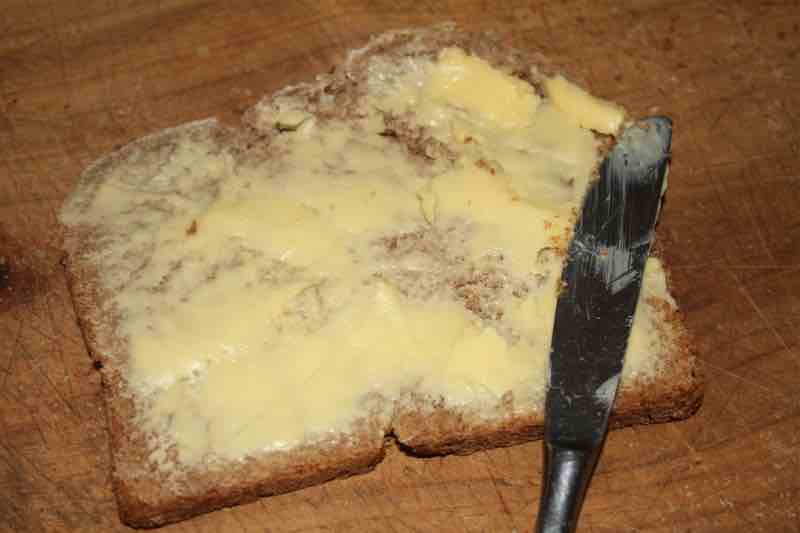
This page was updated by Dr Barrie Lewis DC on 9th January, 2025.
A
group of scientists reporting in the prestigious Annals of Internal
Medicine after following over half a million patients, came to
some very interesting conclusions; they did what is known as a meta-analysis of nearly 80
trials and studies.
Butter is back
In short there is absolutely no clear evidence that avoiding food high in saturated oil like butter, cheese and animal-fat makes you less vulnerable to heart and blood vessel disease.
And the corollary, there is no evidence that food rich in polyunsaturated fat like margarine gives you protection against cardiovascular disease; in fact there is considerable research suggesting that in excess it is highly inflammatory.
The margarine industry's emphatic advertising that changing from butter will protect your heart is utterly spurious; it is based on selective reporting. There is an equal amount of research proving just the contrary; it is fake news.
What is clear from observational studies is that mono-unsaturates from olive oil and avocados are the most protective; and the trans fatty acids in hydrogenated foods cause the greatest damage.
Certainly you can have your butter and eat it with no anxiety providing you are regularly enjoying a lunch like that below.
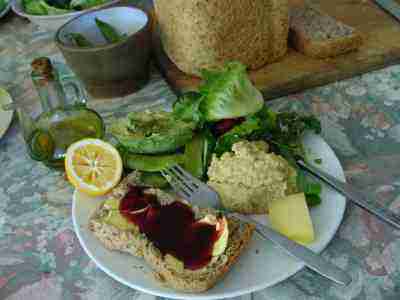 True wholegrain bread, hummus and salads
True wholegrain bread, hummus and saladsBut if you are following one of the many ketogenic food plans I'd rather see you increasing the olive oil and avocados than butter. I have serious difficulties that these diets make no distinction between white bread and that made with 100% real-flour, for example; chalk and cheese but they are all lumped together as carbs.
 100% real wholemeal flour
100% real wholemeal flourChoice foods
Choice foods mean you can have your butter and eat it providing you are enjoying a lunch loaded with salads, some protein and olive oil; thank goodness margarine is history.
We do a lot of bread experiments with our cooking; for example the dough rises far better when using honey rather than sugar for the yeast. Baking with wholemeal is fun.
At around 25g of starch the salad plate above including the slice of wholemeal bread would be considered low carb; unless you are on a ketogenic meal plan.
Research shows that keto can be very nutritious unless you replace the calories from carbs with protein and fat of animal origins. Look rather to hummus, avocado and only a moderate amount of butter.(1)
"Mortality increased when carbohydrates were exchanged for fat or protein derived from animals; and decreased when the substitutions were plant-based."
- Lancet, Sept 01, 2018.
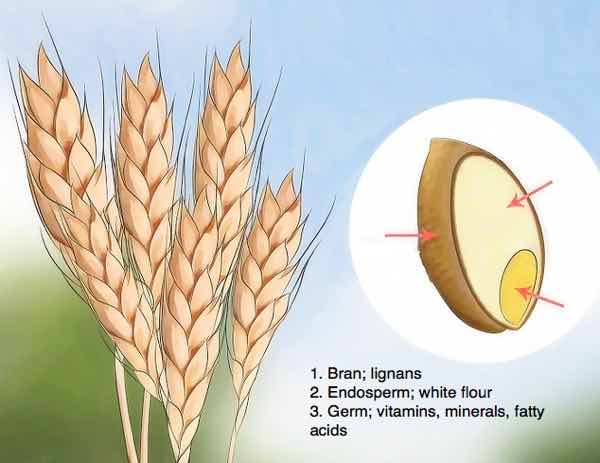
The food companies love it when you buy refined white flour. Separately they can sell you the valuable part at great profit.
The bran for the lignans that help protect the breast from neoplasms, the vitamins and wheat-germ oil are the best part; and the minerals too. Their profits soar; your wellness suffers.
Read about labeling from the whole grains council[2].
Butter is back
Butter is back suggests our taste buds were right all along. It is safe provided we are enjoying our greens too.
Notice the olive oil decanter; fruit fats are mainly monounsaturated which is why the people of the Mediterranean have a lower incidence of heart disease. Well, there may be other reasons too. Let us just say that it's one of the factors.
Extra-virgin olive oil is rich in phytosterols.
These are compounds that have a very similar structure to cholesterol; and compete with it for absorption in the gut. Lower down you will find a link giving more information about them. Or use the search this site function in the navigation bar.
Notice too the bread and butter; and the block of cheese. All are eaten without guilt.
Butter is back is the new buzzword.
Trans-fats
What are trans-fats?
Vegetable oils in nature are made of what is known as the cis-isomer; they are all liquids.
Obviously you cannot easily smear a liquid on your bread so the food manufacturers have come up with a solution; hydrogenate the oil, turning half the fat into the trans-isomer.
Trans-fats have a much lower melting point and are solid at room temperature.
Margarines with a very few exceptions are fifty percent trans-fat.
There are no trans fats in nature; they are man-made and are closer to plastic. They certainly should not be called a food.
The particular interest to a DC concerned about well-being, is that our nerves are coated in a myelin sheath that is mainly fat. Without it, they will not conduct.
"Researchers at Wake Forest University found that trans-fats which are created by partially hydrogenated oil, increase obesity around the belly and redistribute the lard to the abdomen from other parts of the body.
Trans-fats may be found in such delectables as margarine, pastries and cookies; crackers, fried and convenience foods too."
- Web MD
The serious neurological diseases like multiple sclerosis are called demyelinating illnesses. They strip the fatty-sheathes from our nerves; they are no longer able to conduct impulses.
We think it vital that our nerves are coated in normal fat and not plastic; though I must add I know of no research indicating a connection between the trans-isomers and neurological diseases.
It is very irritating that manufacturers now add hydrogenated-oils even to otherwise nutritious foods like peanut butter and marmite; so that they are less runny and will not separate as easily.
Read labels and avoid hydrogenated foods. Mind you lies and statistics prevail everywhere.
On the other side, let us recognize that there is indeed strong evidence linking saturated animal fat with heart disease; this is particularly true when it is associated with abdominal obesity and a poor overall food plan. Many of those who love a richly marbled-steak also want to have french fries with it and eschew salads; now it's a problem.
Nutrition is a very complex and confusing science; there are many things that are still unclear.
At a recent family gathering of 30 persons there was one small green salad and another of cold-storage potato. For the rest it was grilled meat, white hotdog rolls and Coke; and chips of one sort or another.
And it is certainly also significant when it is meat and potatoes; they are particularly low in those phytosterols. The starch in our common grocery store spuds is known to have a very high glycemic index. Those from cold storage turn rapidly into glucose in the blood stream.
New potatoes with butter
There is a gap that spud-lovers can take. New potatoes have far less starch and frankly are much nicer. Most of the nutrients are found in and just beneath the skin; there is no need to peel them. They are a rich source of fibre too. You may have to grow them yourself.
You can enjoy your new potatoes with butter.
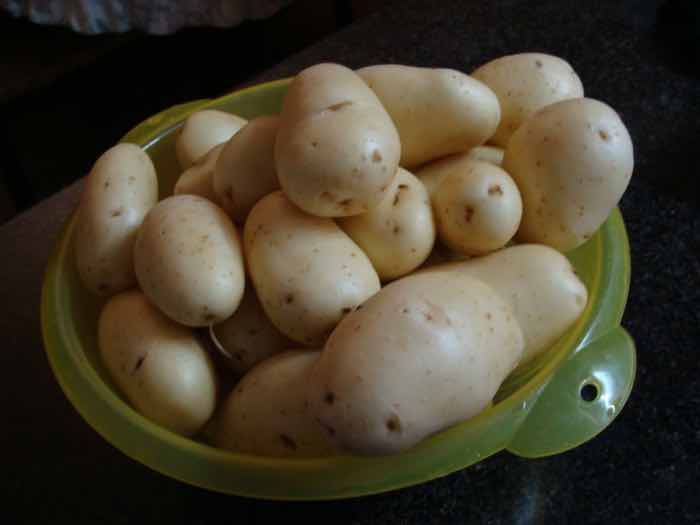
Then you can enjoy latkes and Swiss rösti without guilt.
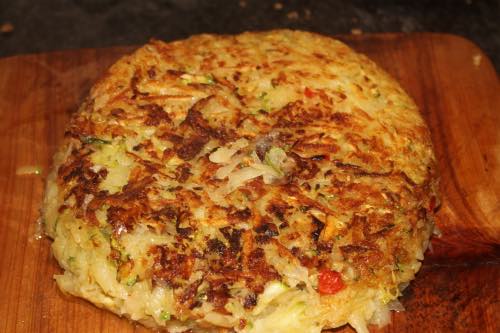
In the absence of salad and fruit on our plates, the sources of the so-called phytochemical foods which compete with the cholesterol we have just eaten, high GI starches like potatoes raise the low density fats and blood sugar; that will not make for a heart friendly scenario.
New potatoes are the exception; enjoying them before the tops are sprayed with Paraquat and within three-days of being lifted, means they are far less likely to cause a spike in our blood glucose.
Beta-carotene in butter
Butter is also a good source of beta-carotene, an important phytonutrient that is the precursor to vitamin A.
Enjoy a moderate amount of butter, along with the yellow foods like carrots, winter squash and yellow grits to make sure we do not develop a serious beta-carotene deficiency.
There were two other exceptions to these vague and contradictory findings.
- Margaric acid, the saturated fat in butter, is actually associated with a lower rate of heart disease#.
- Large amounts of omega-6 polyunsaturated fatty acids found in many seed oils and particularly in processed foods are linked to an increased risk of cardiovascular illnesses.
Confusingly we do absolutely need linoleic acid, a polyunsaturated omega-6 oil in small quantities; far less than is currently added to the typical grocery store food diet.
#Do not think because of its name, that it is a trans-fat; it is straight from the cow and has nothing to do with margarine.
On the other hand, in contradiction with other research, there was little to confirm the protection of fatty-fish and flax seed. Nutrition is complex and disputed. Now we see through a glass darkly; in time all will be made plain.
The French consume more saturated fat per capita than we Americans. They eat butter like it's a food group. I thought about my life back home where I counted every calorie with surgical precision, using a food scale and a calculator. But despite all my efforts I had felt like my body was betraying me as I struggled to control my weight.
How is it that they eat so much butter and stay so lean? Could it be because breakfast is so relaxed with the kind of ease that we can't relate to?
Their conclusions are likely to confuse you, just as they have disturbed the medical world. Another researcher adds that there is little data to support previous guidelines recommending that we eat less saturated fat and more carbohydrate.
The glycemic index of winter squash is around the low 50 mark. Butter is back, so add a dab to your food and you'll reduce it even further.
What do we make of all this? Clearly scientists are not convinced that low fat is associated with a stronger heart; and when combined with high refined carbohydrate, it's definitely aligned with serious neurological diseases.
Furthermore a high saturated fat meal plan is also not absolutely linked to heart conditions. It depends on what else we are eating.
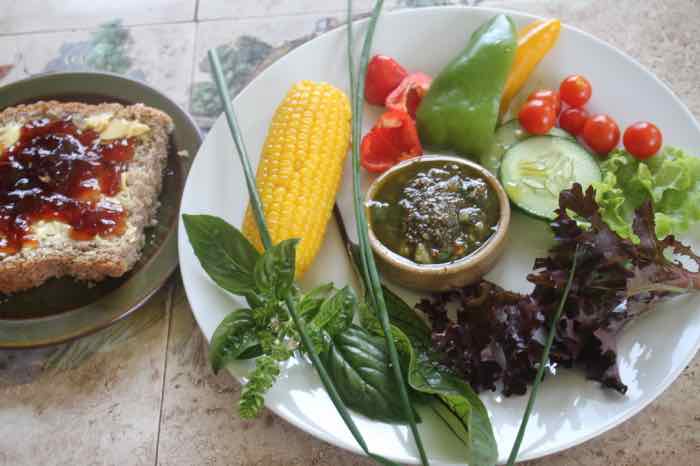 Whole carbs and salad with many colours; no fear of the butter.
Whole carbs and salad with many colours; no fear of the butter.There are other factors at work. Certainly it would seem we can enjoy coconut oil, high in saturated fat, without any doubts.
There is a new fad doing the rounds called banting; it has some merit in that its research removes the now unsubstantiated fear of animal fats provided one is enjoying a broad, whole diet. I go along with that suggestion provided you are eating plenty of fruit, salad and whole grains.
Where I differ from them is that they forbid fruit like apples and
vegetables like butternut, except in very limited quantities because of
their carbohydrate content; and legumes too.
They have not for example made a distinction between those eating butter along with mainly meat and potatoes, and folk enjoying dairy products with a salad and fruit plate.
Make what you will of all this, but I will stick to plenty of olive oil, avocados and animal fat, with no fears because of a good body mass index; and also our varied, ten-colours platters with ample beetroot, broccoli and sweet potatoes for example.
Spinach, nuts and flaxseed always are looking for a place too. We enjoy apples when in season, grapes and as many different fruits as we can grow in our garden.
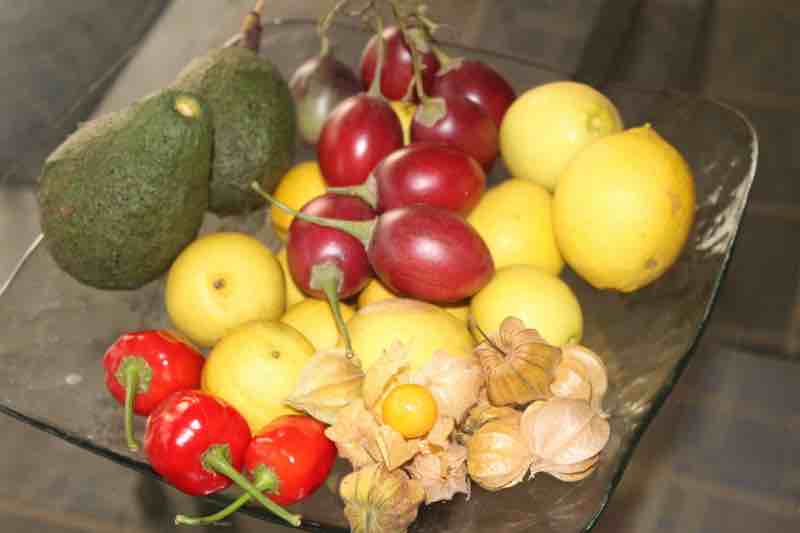
Grinding flax seeds
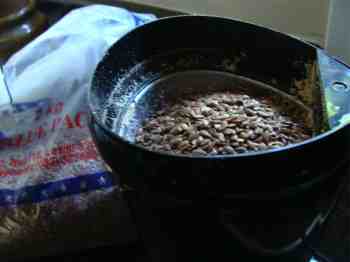
Grinding flax-seeds is vitally important; otherwise they are not digested, pass straight through the bowel and may get caught in a fistula.
For the omnivores amongst us, the options are not difficult; fatty fish like salmon and sardines are fairly easy to get. But for vegetarians, the only simple source of large amounts of omega-3 is from grinding flax seeds yourself and adding them immediately to your breakfast cereal. The oils are oxidised as soon as the hull is cracked; they go rancid.
Freshly-cracked walnuts are great too.
Fish and flax actually produce different omega-3 fatty acids; it's best really to have both, then you can be sure of getting all the right stuff. From the whole seed, because of the added benefits of lignans and other phytonutrients, it is far more beneficial than the oil.
Butter also has an admittedly small amount of omega 3 but what is good is the even ratio with W-6. It is not inflammatory like margarine is.
These fatty-acids then are carried in the bloodstream and stored as triglycerides.
Olive Oil Benefits
Olive-oil benefits are broadly acknowledged, provided it is not processed; look for that which burns at the back of the throat; not an alternative to butter, but in addition to.
Recognising that the science is giving us very confusing signals, we should follow our own instincts. One of those is that olive-oil was never banished to Coventry, and so has no need to come back; it is here to stay. But do choose the unprocessed extra virgin; it has the phytosterols that are so vital.
Whenever we start processing a food, it loses something. The monounsaturated fats of olives and avocados are mainly oleic acid, making them the Queens of the Mountain; the coconut is a more controversial contender to the throne.
- What are phytosterols? Find this page using the Site Search function.
Panera Bread menu recipe
Baking is so easy with the help of a bread-machine.
Bread and butter have been staples since time immemorial but there are numerous problems associated with the commercial loaf today. It's loaded with chemicals, sugar and salt; and with far too much polyunsaturated fat. It has a high glycemic index; it is turned rapidly into blood-glucose giving an untoward insulin rush that makes it fattening.
There is only one solution that I can think of; buy a bread-maker and spend five minutes every day baking your own artisan loaf. That's all it takes.
Better still add some protein and fat and then you have low GI bread. Butter is back; in your slice and on it. Having fun with homemade dips made with cream-cheese and olive oil will lower the glycemic index even further.
Just the smell of baking bread makes it all worthwhile.
If you are seriously overweight, then I go along with most of the tenets of the ketogenic diets but have some doubts. Read Banting rebuttal if you're interested; that means little or no bread until your BMI is under thirty. One of its big virtues is that you are not constantly hungry; quite the contrary, you feel satiated.[3]
If you are going to take this imperative seriously then you might as well find out about 100 percent real flour. This bakes the loaf one need not fear; still keeping the glycemic load down.
Hydrogenated-foods
Hydrogenated-foods are highly toxic; it's a mercy that butter is back.
We alluded above to the dangers of trans-isomers; they are manufactured by hydrogenating good cis fats to make them solid at room temperature.
Margarine will not be back. Anything that tastes as bad must be awful. Butter is without a doubt, unlimited in my book but only if you are eating food rich in vegetables, fruits and salads; the orange in winter squash, the green in broccoli and the purple in beets for example.
Whilst I do not believe we can yet confidently describe butter as a choice food, it is certainly not as bad as margarine; olive oil is better. A century ago when our forebears were eating plenty of natural, unprocessed nosh including animal fat there was not the cardiovascular disease of today.
Useful links @ Butter is back
- Dietary carbohydrate intake and mortality
- Whole grains council
- Banting rebuttal. Web: https://tinyurl.com/mphz4r8a
When browsing use right click and "Open Link in New Tab" or you may get a bad gateway signal.
Newsletter
Our newsletter is entitled "create a cyan zone" at your home, preserving both yourself and Mother Earth for future generations; and the family too, of course. We promise not to spam you with daily emails promoting various products. You may get an occasional nudge to buy one of my books.
Here are the back issues.
- Lifestyle and ideal body weight
- What are ultra-processed foods?
- Investing in long-term health
- Diseases from plastic exposure
- Intensive lifestyle management for obesity has limited value
- A world largely devoid of Parkinson's Disease
- The impact of friendly bacteria in the tum on the prevention of cancer
- There's a hole in the bucket
- Everyone is talking about weight loss drugs
- Pull the sweet tooth
- If you suffer from heartburn plant a susu
- Refined maize meal and stunting
- Should agriculture and industry get priority for water and electricity?
- Nature is calling
- Mill your own flour
- Bake your own sourdough bread
- Microplastics from our water
- Alternative types of water storage
- Wear your clothes out
- Comfort foods
- Create a bee-friendly environment
- Go to bed slightly hungry
- Keep bees
- Blue zone folk are religious
- Reduce plastic waste
- Family is important
- What can go in compost?
- Grow broad beans for longevity
- Harvest and store sunshine
- Blue zone exercise
- Harvest and store your rainwater
- Create a cyan zone at your home
Did you find this page interesting? How about forwarding it to a friendly book or food junkie? Better still, a social media tick would help.
- Bernard Preston homepage
- Arteries
- Butter Is Back
Address:
56 Groenekloof Rd,
Hilton, KZN
South Africa
Website:
https://www.bernard-preston.com